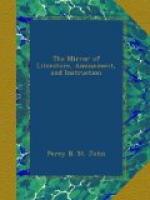From the success of Mr. Haydon in the particular line of art requisite for scenes of real humour, it is not unlikely that his execution of the first picture, the “Election” may prove one of the most fortunate events in his professional career, and turn out to be one of the “sweet uses of adversity,” by eliciting talent which he probably did not believe himself to possess. Much as we admire this style of art, we can but deplore that purchasers cannot be found for such pictures as his Entry into Jerusalem, and Judgment of Solomon, both which, with two others, are exhibited in the room with the Chairing of the Members. Out of the scores of new churches which are yearly completed, surely some altar-pieces might be introduced with propriety; and when we consider the peculiar influence which such scenes as those chosen by Mr. Haydon are known to possess over the human heart, we do not think their entire exclusion from modern churches contributes to their devotional character.
Such pictures are intended for better purposes than mere seclusion in large galleries and mansions, of which there are but comparatively few in England; and it is always with regret that we see these noble efforts of art in such profitless situations. Occasionally a nobleman, or parochial taste, introduces a valuable painted window, and sometimes an altarpiece into a church; but we wish the practice were more general.
* * * * *
RETROSPECTIVE GLEANINGS
* * * * *
ENGLAND IN THE DAYS OF GOOD “QUEEN BESS.”
The misery and mendicity which prevailed in this country before the provisions of the poor laws in the time of Elizabeth became duly enforced, might be proved by the following extract from a curious old pamphlet, which describes, in very forcible language, the poverty and idleness which prevailed in one of the fairest and most fertile districts of the kingdom, viz.—
The Golden Vale in Herefordshire, (being ye pride of al that country,) being the richest yet (for want of employment) the plentifullest place of poore in the kingdom—yielding two or three hundred folde; the number so increasing (idleness having gotten the upper hand;) if trades bee not raised—beggery will carry such reputation in my quarter of the country, as if it had the whole to halves.




